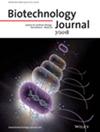Approaches for Cannabinoid Glycosylation Catalyzed by CrUGT74AN3 and BlCGTase
Abstract
Phytocannabinoids are natural products with highly promising pharmaceutical potential, mainly known from the plant Cannabis sativa. However, their bioavailability is limited due to their high lipophilicity. Modification through glycosylation is known to improve the water solubility and stability of molecules. Enzymatic glycosylation requires specific enzymes with high catalytic activity in combination with efficient production systems. To date, only a few glycosyltransferases with activity toward cannabinoids have been described. In this study, we explore the substrate spectrum of the promiscuous UDP-glycosyltransferase CrUGT74AN3 from Catharanthus roseus and demonstrate activity towards a broad range of cannabinoids and their biosynthetic intermediates. The highest activity was observed using cannabidiol (CBD) as an acceptor molecule. In addition, we show efficient biotransformation of CBD in an engineered Saccharomyces cerevisiae strain. We investigate the influence of the hydrolytic activity of endogenous glucosidases and identify the UDP-glucose supply as a limiting factor in the yeast system. The co-expression of CrUGT74AN3 and a cyclodextrin glycosyltransferase from Bacillus licheniformis in the engineered yeast strain led to the production of CBD-glycosides with up to six glucose moieties from CBD and cyclodextrin in vivo. Finally, we confirm the applicability of the engineered yeast systems to other cannabinoids using cannabigerol and cannabinol.


 求助内容:
求助内容: 应助结果提醒方式:
应助结果提醒方式:


